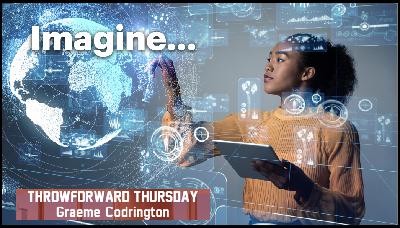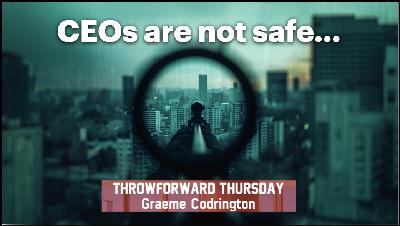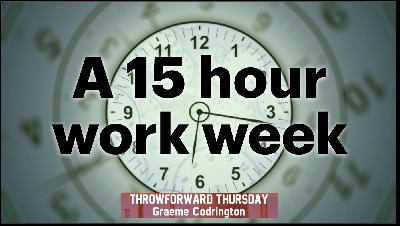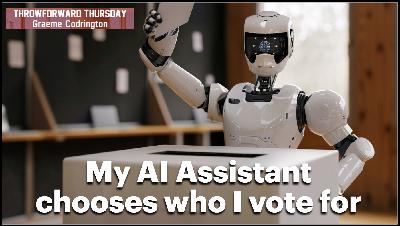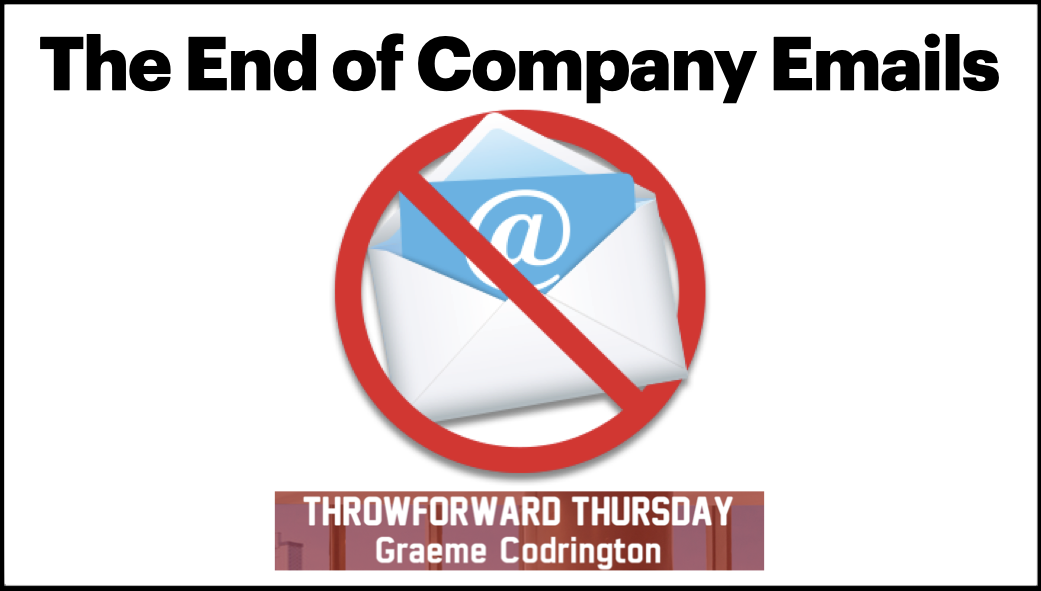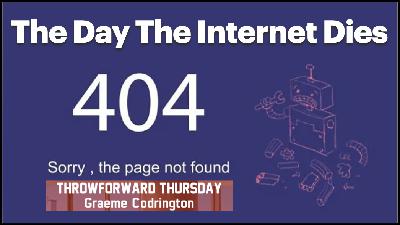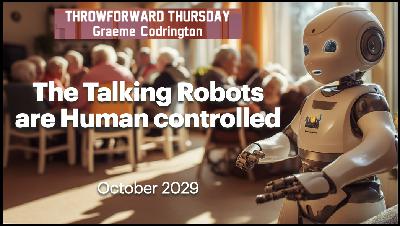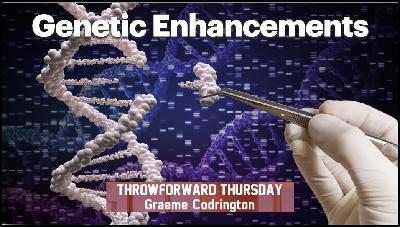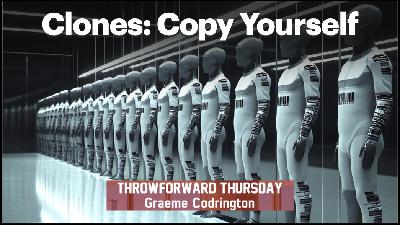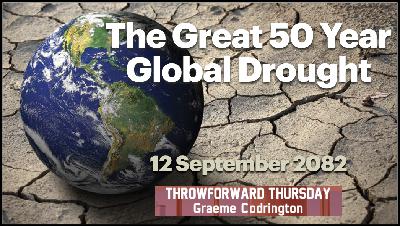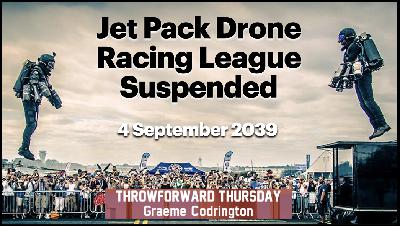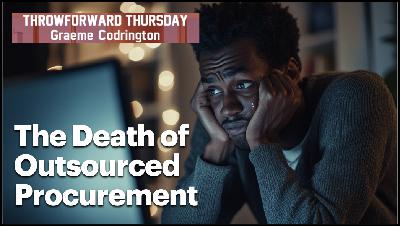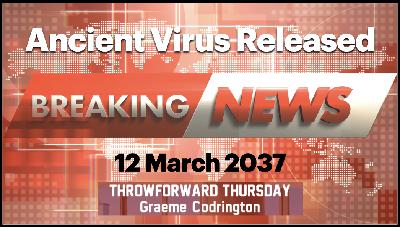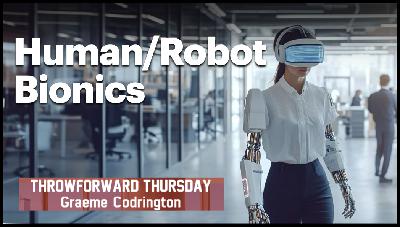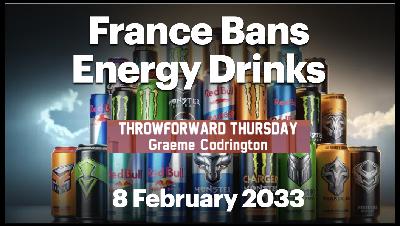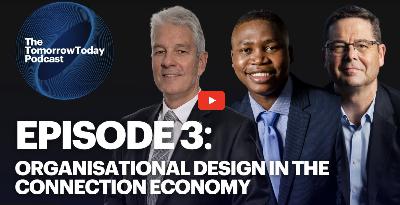Discover Graeme Codrington's Future of Work
Graeme Codrington's Future of Work

Graeme Codrington's Future of Work
Author: Graeme Codrington
Subscribed: 3Played: 172Subscribe
Share
© Graeme Codrington 2023
Description
The future is arriving faster than ever. Graeme Codrington highlights key issues we need to consider to prepare for tomorrow's workplace today, including audio feed of his weekly ThrowForward Thursday series.
198 Episodes
Reverse
Imagine... the future is imaginable. And our imaginations help to set the tone for how we engage with the future, and the world around us. So, at the end of 2024, let's imagine the best possible future we can - whatever that might mean for you. For me, it would be a world without war. Thank you for your support and feedback on our scenarios over the past year. We plan to come back in the new year with a whole new format for these scenarios - we are excited to share that with you. But first... take a break. Have a refreshing and rejuvenating holiday, and we will see you in 2025. ABOUT GRAEME CODRINGTON Speaker, author and expert on the future of work, researching disruptive change and helping leaders and their teams understand and respond to tomorrow's world today. I help people make the future place of work a remarkable place for all of us. CONNECT WITH GRAEME AND THE TOMORROWTODAY TEAM Let's start a conversation to find out where I can make the biggest impact in your journey to being future-fit. Email me graeme@tomorrowtodayglobal.com or connect on LinkedIn. KEYNOTE PRESENTATIONS AND WORKSHOPS https://www.graemecodrington.com ACCESS 2 FREE SCENARIOS Our Strategic Imagination Toolkit designed to help you develop your strategic imagination in order to consider the implications for your team and organisation today. Download here for free SUBSCRIBE TO MY YOUTUBE CHANNEL www.youtube.com/user/graemecodrington NEWSLETTER Subscribe to our team's weekly newsletter filled with insights and practical resources to help you succeed in the future of work. Sign up here.
On December 4, 2024, the CEO of one of America's largest healthcare insurers was shot dead on the streets of Manhattan. Angry people, living in a world that is filled with inequality and feeling squeezed on every side, will eventually snap. This is not something we want, nor is it a call to arms. But it is a possible future scenario that CEOs of large companies might need to be as careful of their personal security as many politicians currently are. The antidote is to build future-proof businesses that see doing good as good for business. This isn't just a cute tagline - it is a core pillar of the DNA of a future-proof business. Our team at TomorrowToday helps organisations to understand what a future-proof DNA looks like, and to identify the drivers of disruptive change taking us into that future. Contact us to discover more about our work: http://www.tomorrowtoday.consulting ABOUT GRAEME CODRINGTON Speaker, author and expert on the future of work, researching disruptive change and helping leaders and their teams understand and respond to tomorrow's world today. I help people make the future place of work a remarkable place for all of us. CONNECT WITH GRAEME AND THE TOMORROWTODAY TEAM Let's start a conversation to find out where I can make the biggest impact in your journey to being future-fit. Email me graeme@tomorrowtodayglobal.com or connect on LinkedIn. KEYNOTE PRESENTATIONS AND WORKSHOPS https://www.graemecodrington.com ACCESS 2 FREE SCENARIOS Our Strategic Imagination Toolkit designed to help you develop your strategic imagination in order to consider the implications for your team and organisation today. Download here for free NEWSLETTER Subscribe to our team's weekly newsletter filled with insights and practical resources to help you succeed in the future of work. Sign up here.
It could happen. Sometime in the future. Data centres use an incredible amount of electricity and water. Towns that incentivise these data centres to locate nearby for jobs and tax benefits might find themselves dealing with unrealistic demands for power and water - to the point where a data centre could sue the town to continue providing them with water even if it means the people living in the town get cut off. For more details of just how much power and water data centres use, listen to Paris Marx’s 4 part mini series on the Tech Won’t Save Us Podcast: https://techwontsave.us/episode/241_data_vampires_going_hyperscale_episode_1 Our team at TomorrowToday helps organisations to understand what a future-proof DNA looks like, and to identify the drivers of disruptive change taking us into that future. Contact us to discover more about our work: http://www.tomorrowtoday.consulting ABOUT GRAEME CODRINGTON Speaker, author and expert on the future of work, researching disruptive change and helping leaders and their teams understand and respond to tomorrow's world today. I help people make the future place of work a remarkable place for all of us. CONNECT WITH GRAEME AND THE TOMORROWTODAY TEAM Let's start a conversation to find out where I can make the biggest impact in your journey to being future-fit. Email me graeme@tomorrowtodayglobal.com or connect on LinkedIn. KEYNOTE PRESENTATIONS AND WORKSHOPS https://www.graemecodrington.com ACCESS 2 FREE SCENARIOS Our Strategic Imagination Toolkit designed to help you develop your strategic imagination in order to consider the implications for your team and organisation today. Download here for free SUBSCRIBE TO MY YOUTUBE CHANNEL www.youtube.com/user/graemecodrington NEWSLETTER Subscribe to our team's weekly newsletter filled with insights and practical resources to help you succeed in the future of work. Sign up here.
Nearly 100 years, the famous economist John Maynard Keynes predicted that by 2030 we would all be working just 15 hours a week. If only, right? What went wrong? There is an answer, but you're probably not going to like it. We need to change the whole system to ensure we are not crushed by a system that seeks relentless productivity, endless activity and soul sucking workloads. Maybe the 15 hour work week is an idealistic fantasy. Or maybe it's a motivating goal to drive a change in our current world of work? ABOUT GRAEME CODRINGTON Speaker, author and expert on the future of work, researching disruptive change and helping leaders and their teams understand and respond to tomorrow's world today. I help people make the future place of work a remarkable place for all of us. CONNECT WITH GRAEME AND THE TOMORROWTODAY TEAM Let's start a conversation to find out where I can make the biggest impact in your journey to being future-fit. Email me graeme@tomorrowtodayglobal.com or connect on LinkedIn. KEYNOTE PRESENTATIONS AND WORKSHOPS https://www.graemecodrington.com ACCESS 2 FREE SCENARIOS Our Strategic Imagination Toolkit designed to help you develop your strategic imagination in order to consider the implications for your team and organisation today. Download here for free SUBSCRIBE TO MY YOUTUBE CHANNEL www.youtube.com/user/graemecodrington NEWSLETTER Subscribe to our team's weekly newsletter filled with insights and practical resources to help you succeed in the future of work. Sign up here.
Elections are messy, noisy and can overwhelm voters with too much information and too many choices. In the future, it could make sense for us to rely on our personal AI assistants - algorithms trained on our preferences, understanding our worldviews and able to mimic who we are in communications and interactions - to analyse every politician, their promises, their track record and what we expect them to be able to achieve, and advise us on the best person to vote for in any given election. It’s a great application of the power of data analytics and pattern recognition that GenAI apps are capable of, and it would probably help voters make more informed choices… rather than voting based on charisma, fears or history. #election2024 #election2050 #future ABOUT GRAEME CODRINGTON Speaker, author and expert on the future of work, researching disruptive change and helping leaders and their teams understand and respond to tomorrow's world today. I help people make the future place of work a remarkable place for all of us. CONNECT WITH GRAEME AND THE TOMORROWTODAY TEAM Let's start a conversation to find out where I can make the biggest impact in your journey to being future-fit. Email me graeme@tomorrowtodayglobal.com or connect on LinkedIn. KEYNOTE PRESENTATIONS AND WORKSHOPS https://www.graemecodrington.com ACCESS 2 FREE SCENARIOS Our Strategic Imagination Toolkit designed to help you develop your strategic imagination in order to consider the implications for your team and organisation today. Download here for free SUBSCRIBE TO MY YOUTUBE CHANNEL www.youtube.com/user/graemecodrington NEWSLETTER Subscribe to our team's weekly newsletter filled with insights and practical resources to help you succeed in the future of work. Sign up here.
Don't get too excited by the title - it's not quite what you think. In the future, it is possible that companies will not supply us with email addresses, but we will rather bring our own (just like we buy our own cars, phones and have your own personal cellphone numbers these days). This is more than a technology conversation - this is about fractional workers (senior people working for more than one company at the same time) and top talent being confident to say that their personal brand is more important than the brand of the company they work for (we do that already on LinkedIn, by the way). Now... if only we could actually get rid of email. Am I right? Don't forget that our team at TomorrowToday Global works tirelessly to help our clients imagine scenarios for the future, anticipate disruptive change and build adaptive DNA in your business today. Contact us to find out how we can help you do this. ABOUT GRAEME CODRINGTON Speaker, author and expert on the future of work, researching disruptive change and helping leaders and their teams understand and respond to tomorrow's world today. I help people make the future place of work a remarkable place for all of us. CONNECT WITH GRAEME AND THE TOMORROWTODAY TEAM Let's start a conversation to find out where I can make the biggest impact in your journey to being future-fit. Email me graeme@tomorrowtodayglobal.com or connect on LinkedIn. KEYNOTE PRESENTATIONS AND WORKSHOPS https://www.graemecodrington.com ACCESS 2 FREE SCENARIOS Our Strategic Imagination Toolkit designed to help you develop your strategic imagination in order to consider the implications for your team and organisation today. Download here for free SUBSCRIBE TO MY YOUTUBE CHANNEL www.youtube.com/user/graemecodrington NEWSLETTER Subscribe to our team's weekly newsletter filled with insights and practical resources to help you succeed in the future of work. Sign up here.
Imagine logging into your web browser and there's just nothing: no websites anywhere. You check your internet connection, and that seems fine. Your phone seems to be working. Except most of the apps are showing error messages, and there are just no websites. This is what would happen if the DNS system stops working. This is the system that turns your website request into an address the IP and HTTP systems can understand. And our DNS systems are incredibly fragile, completely out of date, and most are run by under supported volunteers. Yes, you read that right. One of the most important parts of the Internet sounds like it organised worse than your local primary school parent association. We live in a fragile world - way more fragile than we know. And the system could fall over at any time. It did so earlier this year, with a bad Microsoft update shutting down airports, banks and water processing plants for two days. That was a warning of worse things to come. On that happy note... have a great weekend. ABOUT GRAEME CODRINGTON Speaker, author and expert on the future of work, researching disruptive change and helping leaders and their teams understand and respond to tomorrow's world today. I help people make the future place of work a remarkable place for all of us. CONNECT WITH GRAEME AND THE TOMORROWTODAY TEAM Let's start a conversation to find out where I can make the biggest impact in your journey to being future-fit. Email me graeme@tomorrowtodayglobal.com or connect on LinkedIn. KEYNOTE PRESENTATIONS AND WORKSHOPS https://www.graemecodrington.com ACCESS 2 FREE SCENARIOS Our Strategic Imagination Toolkit designed to help you develop your strategic imagination in order to consider the implications for your team and organisation today. Download here for free SUBSCRIBE TO MY YOUTUBE CHANNEL www.youtube.com/user/graemecodrington NEWSLETTER Subscribe to our team's weekly newsletter filled with insights and practical resources to help you succeed in the future of work. Sign up here.
Come with me to 2029, when a dark side of the robotic world becomes reality. The robots we will deploy in care homes and kindergartens - those humanoid robots who look after our elderly and children - are now revealed to be controlled by underpaid and overworked human operators in sweat shops on the other side of the world. Yes, of course, we will one day have fully autonomous, talking robots in the future. But for quite some time between now and then, the best way to achieve this is to have some level of human control. I don't think it will be benign and beneficial to the operators, sadly. There's a cautionary tale here about capitalism, worker rights, technology hype and the illusions of progress. ABOUT GRAEME CODRINGTON Speaker, author and expert on the future of work, researching disruptive change and helping leaders and their teams understand and respond to tomorrow's world today. I help people make the future place of work a remarkable place for all of us. CONNECT WITH GRAEME AND THE TOMORROWTODAY TEAM Let's start a conversation to find out where I can make the biggest impact in your journey to being future-fit. Email me graeme@tomorrowtodayglobal.com or connect on LinkedIn. KEYNOTE PRESENTATIONS AND WORKSHOPS https://www.graemecodrington.com ACCESS 2 FREE SCENARIOS Our Strategic Imagination Toolkit designed to help you develop your strategic imagination in order to consider the implications for your team and organisation today. Download here for free SUBSCRIBE TO MY YOUTUBE CHANNEL www.youtube.com/user/graemecodrington NEWSLETTER Subscribe to our team's weekly newsletter filled with insights and practical resources to help you succeed in the future of work. Sign up here.
It's sometime in the future, and the next version of your favourite smartphone has just been released. Once again, the marketing hype is astounding, but the reality disappointing. What did they say: it's a few millimetres smaller (or bigger), and slightly lighter, and the camera has some extra megapixels and zoom, and ... that's it? Smartphones should be curing cancer already. There's more computing power in my smartphone than existed on the entire planet when I was born half a century ago. As much as we live in a technology world, innovation seems to have stalled a bit. We've got multi-billion dollar companies competing with each other for incremental improvements in features that are already good enough. What we really want is innovation that excites and delights, that makes a real difference to our lived experience, and that changes the world. This week's ThrowForward Thursday is bordering on a rant, but it has an important point to make. What is your company doing to create new products and services that excite and delight your customers and clients? We need to uplift our innovation goals and aim to do much more than merely optimise stuff that's already good enough. ABOUT GRAEME CODRINGTON Speaker, author and expert on the future of work, researching disruptive change and helping leaders and their teams understand and respond to tomorrow's world today. I help people make the future place of work a remarkable place for all of us. CONNECT WITH GRAEME AND THE TOMORROWTODAY TEAM Let's start a conversation to find out where I can make the biggest impact in your journey to being future-fit. Email me graeme@tomorrowtodayglobal.com or connect on LinkedIn. KEYNOTE PRESENTATIONS AND WORKSHOPS https://www.graemecodrington.com ACCESS 2 FREE SCENARIOS Our Strategic Imagination Toolkit designed to help you develop your strategic imagination in order to consider the implications for your team and organisation today. Download here for free SUBSCRIBE TO MY YOUTUBE CHANNEL www.youtube.com/user/graemecodrington NEWSLETTER Subscribe to our team's weekly newsletter filled with insights and practical resources to help you succeed in the future of work. Sign up here.
Imagine what the world would look like if we all had the data about our genetic makeup, and we could see the many multiple ways our genetics shape who we are and what we are capable of. Imagine that gender wasn't the issue it is today as we think of the classifications of sports codes - no longer would be it "male" and "female" as the only two categories, but rather many different categories based on whatever genetic characteristics were most applicable. And then imagine, we could also apply genetic enhancements to these sporting codes? We can only imagine now. But this is our future reality. ABOUT GRAEME CODRINGTON Speaker, author and expert on the future of work, researching disruptive change and helping leaders and their teams understand and respond to tomorrow's world today. I help people make the future place of work a remarkable place for all of us. CONNECT WITH GRAEME AND THE TOMORROWTODAY TEAM Let's start a conversation to find out where I can make the biggest impact in your journey to being future-fit. Email me graeme@tomorrowtodayglobal.com or connect on LinkedIn. KEYNOTE PRESENTATIONS AND WORKSHOPS https://www.graemecodrington.com ACCESS 2 FREE SCENARIOS Our Strategic Imagination Toolkit designed to help you develop your strategic imagination in order to consider the implications for your team and organisation today. Download here for free SUBSCRIBE TO MY YOUTUBE CHANNEL www.youtube.com/user/graemecodrington NEWSLETTER Subscribe to our team's weekly newsletter filled with insights and practical resources to help you succeed in the future of work. Sign up here.
They're coming (as you will see if you watch the video on YouTube, mine has already arrived ;-). But the clones of the near future won't actually be copies of our bodies, but rather algorithms designed to copy our thinking. https://youtu.be/B4hwb1ELvXY Sometime in the future, we will develop the technologies to allow us to create copies of humans. But that's probably a long time in the future. More practically, we should be able to copy the way that people think, and digitise their personas, styles, knowledge and thinking. Using Large Language Model type tech, we could make these algorithms searchable and interactive, and in that way clone their thinking. ABOUT GRAEME CODRINGTON Speaker, author and expert on the future of work, researching disruptive change and helping leaders and their teams understand and respond to tomorrow's world today. I help people make the future place of work a remarkable place for all of us. CONNECT WITH GRAEME AND THE TOMORROWTODAY TEAM Let's start a conversation to find out where I can make the biggest impact in your journey to being future-fit. Email me graeme@tomorrowtodayglobal.com or connect on LinkedIn. KEYNOTE PRESENTATIONS AND WORKSHOPS https://www.graemecodrington.com ACCESS 2 FREE SCENARIOS Our Strategic Imagination Toolkit designed to help you develop your strategic imagination in order to consider the implications for your team and organisation today. Download here for free SUBSCRIBE TO MY YOUTUBE CHANNEL www.youtube.com/user/graemecodrington NEWSLETTER Subscribe to our team's weekly newsletter filled with insights and practical resources to help you succeed in the future of work. Sign up here.
It's September 2082, and we mark the 50th anniversary of the official start of what has become The Great 50-Year Global Drought. Cities have been emptied, country borders changed, wars fought and entire economies gutted... and there seems to be no end in sight. This episode of ThrowForward Thursday is based on historical facts. Back in 1177BC, a 300 year drought caused the almost complete collapse of multiple civilisations in the Middle East and Eastern Mediterranean areas. You can listen to Dan Snow's History Hit podcast, as he interviews Eric Cline, the author of '1177 B.C.: The Year Civilization Collapsed': https://podcasts.apple.com/in/podcast/the-bronze-age-collapse/id1042631089?i=1000664352855 It's a sobering lesson from the past. It's an alarming possibility for our future. ABOUT GRAEME CODRINGTON Speaker, author and expert on the future of work, researching disruptive change and helping leaders and their teams understand and respond to tomorrow's world today. I help people make the future place of work a remarkable place for all of us. CONNECT WITH GRAEME AND THE TOMORROWTODAY TEAM Let's start a conversation to find out where I can make the biggest impact in your journey to being future-fit. Email me graeme@tomorrowtodayglobal.com or connect on LinkedIn. KEYNOTE PRESENTATIONS AND WORKSHOPS https://www.graemecodrington.com ACCESS 2 FREE SCENARIOS Our Strategic Imagination Toolkit designed to help you develop your strategic imagination in order to consider the implications for your team and organisation today. Download here for free SUBSCRIBE TO MY YOUTUBE CHANNEL www.youtube.com/user/graemecodrington NEWSLETTER Subscribe to our team's weekly newsletter filled with insights and practical resources to help you succeed in the future of work. Sign up here.
Sports News Headlines for 4 September 2039: Jet Pack Drone Racing League Suspended Just ahead of the first African Olympic Games in 2040, the latest Olympic sport of Jet Pack Drone Racing has been dealt a blow as two more deaths results in the suspension of the European League. What might the future of dangerous sports look like? How do we push the boundaries of human endeavour while minimising risks? ABOUT GRAEME CODRINGTON Speaker, author and expert on the future of work, researching disruptive change and helping leaders and their teams understand and respond to tomorrow's world today. I help people make the future place of work a remarkable place for all of us. CONNECT WITH GRAEME AND THE TOMORROWTODAY TEAM Let's start a conversation to find out where I can make the biggest impact in your journey to being future-fit. Email me graeme@tomorrowtodayglobal.com or connect on LinkedIn. KEYNOTE PRESENTATIONS AND WORKSHOPS https://www.graemecodrington.com ACCESS 2 FREE SCENARIOS Our Strategic Imagination Toolkit designed to help you develop your strategic imagination in order to consider the implications for your team and organisation today. Download here for free SUBSCRIBE TO MY YOUTUBE CHANNEL www.youtube.com/user/graemecodrington NEWSLETTER Subscribe to our team's weekly newsletter filled with insights and practical resources to help you succeed in the future of work. Sign up here.
More of a hope than a prediction, this episode of ThrowForward Thursday has a rant warning attached, as we imagine a future where companies have stopped outsourcing their supplier management to procurement services that make it incredibly difficult to sign contracts, send invoices and get paid for the products and services rendered. Stopped because - maybe - it has been made illegal to outsource procurement! The cost savings companies make by outsourcing procurement services are completely outweighed by the brand and reputation damage they incur as suppliers are made to jump through time-consuming and costly hoops just to get paid. Let's imagine a future where companies are driven more by creating a great environment in which to do business than they are by cost-cutting efficiencies. ABOUT GRAEME CODRINGTON Speaker, author and expert on the future of work, researching disruptive change and helping leaders and their teams understand and respond to tomorrow's world today. I help people make the future place of work a remarkable place for all of us. CONNECT WITH GRAEME AND THE TOMORROWTODAY TEAM Let's start a conversation to find out where I can make the biggest impact in your journey to being future-fit. Email me graeme@tomorrowtodayglobal.com or connect on LinkedIn. KEYNOTE PRESENTATIONS AND WORKSHOPS https://www.graemecodrington.com ACCESS 2 FREE SCENARIOS Our Strategic Imagination Toolkit designed to help you develop your strategic imagination in order to consider the implications for your team and organisation today. Download here for free SUBSCRIBE TO MY YOUTUBE CHANNEL www.youtube.com/user/graemecodrington NEWSLETTER Subscribe to our team's weekly newsletter filled with insights and practical resources to help you succeed in the future of work. Sign up here.
Breaking news in 2037: the thawing of Arctic ice releases a 40,000 year old virus that doctors have never seen before. Another unintended consequence of global warming, and a reminder that our world is changing dramatically right now. How would your business respond to another pandemic lockdown? What would the impact of a global health emergency be on your infrastructure, supply chain, and market. These are scenarios worth considering as you build antifragility into your business. ABOUT GRAEME CODRINGTON Speaker, author and expert on the future of work, researching disruptive change and helping leaders and their teams understand and respond to tomorrow's world today. I help people make the future place of work a remarkable place for all of us. CONNECT WITH GRAEME AND THE TOMORROWTODAY TEAM Let's start a conversation to find out where I can make the biggest impact in your journey to being future-fit. Email me graeme@tomorrowtodayglobal.com or connect on LinkedIn. KEYNOTE PRESENTATIONS AND WORKSHOPS https://www.graemecodrington.com ACCESS 2 FREE SCENARIOS Our Strategic Imagination Toolkit designed to help you develop your strategic imagination in order to consider the implications for your team and organisation today. Download here for free SUBSCRIBE TO MY YOUTUBE CHANNEL www.youtube.com/user/graemecodrington NEWSLETTER Subscribe to our team's weekly newsletter filled with insights and practical resources to help you succeed in the future of work. Sign up here. Contact our team at TomorrowToday for more assistance in building future-ready, antifragile organisations.
'Bionic' means Humans and Technology not just working with each other, but augmenting and even integrating to supercharge our outputs. There are three obvious ways this could happen: (1) Robotic exoskeletons and human/robot hybrids, (2) software and applications augmenting human intelligence, and (3) techno-diversity where technology becomes part of our diversity quotient. We need to move from a goal of automation to a mindset of augmentation. NOTE: The book referenced in the video is David McCandless, "Information is Beautiful". See his excellent website: https://informationisbeautiful.net ABOUT GRAEME CODRINGTON Speaker, author and expert on the future of work, researching disruptive change and helping leaders and their teams understand and respond to tomorrow's world today. I help people make the future place of work a remarkable place for all of us. CONNECT WITH GRAEME AND THE TOMORROWTODAY TEAM Let's start a conversation to find out where I can make the biggest impact in your journey to being future-fit. Email me graeme@tomorrowtodayglobal.com or connect on LinkedIn. KEYNOTE PRESENTATIONS AND WORKSHOPS https://www.graemecodrington.com ACCESS 2 FREE SCENARIOS Our Strategic Imagination Toolkit designed to help you develop your strategic imagination in order to consider the implications for your team and organisation today. Download here for free SUBSCRIBE TO MY YOUTUBE CHANNEL www.youtube.com/user/graemecodrington NEWSLETTER Subscribe to our team's weekly newsletter filled with insights and practical resources to help you succeed in the future of work. Sign up here.
Imagine a world where a government bans energy drinks if they are proven to be bad for public health, and people are abusing their impact and causing damage to themselves and others. This is not a prediction, just a scenario. The question for you in your company is how would you handle a change in sentiment towards your products and services, maybe even to the point where some or all of what you do is banned by the State. It's about making sure you've considered worst case scenarios in your planning. If you'd like help thinking about future trends, or future-proofing your company strategy, please contact our team to chat about what we can do for you. See our consulting work at http://www.tomorrowtoday.consulting ABOUT GRAEME CODRINGTON Speaker, author and expert on the future of work, researching disruptive change and helping leaders and their teams understand and respond to tomorrow's world today. I help people make the future place of work a remarkable place for all of us. CONNECT WITH GRAEME AND THE TOMORROWTODAY TEAM Let's start a conversation to find out where I can make the biggest impact in your journey to being future-fit. Email me graeme@tomorrowtodayglobal.com or connect on LinkedIn. KEYNOTE PRESENTATIONS AND WORKSHOPS https://www.graemecodrington.com ACCESS 2 FREE SCENARIOS Our Strategic Imagination Toolkit designed to help you develop your strategic imagination in order to consider the implications for your team and organisation today. Download here for free SUBSCRIBE TO MY YOUTUBE CHANNEL www.youtube.com/user/graemecodrington NEWSLETTER Subscribe to our team's weekly newsletter filled with insights and practical resources to help you succeed in the future of work. Sign up here.
This is the start of Season 5 of ThrowForward Thursday. Welcome to 2029, where a weekly 15 second recording of your voice is used to diagnose a whole range of diseases and give early warnings of health problems in your body. This idea is based on the reality of recent medical experiments. Read more in the first comment below. ABOUT GRAEME CODRINGTON Speaker, author and expert on the future of work, researching disruptive change and helping leaders and their teams understand and respond to tomorrow's world today. I help people make the future place of work a remarkable place for all of us. CONNECT WITH GRAEME AND THE TOMORROWTODAY TEAM Let's start a conversation to find out where I can make the biggest impact in your journey to being future-fit. Email me graeme@tomorrowtodayglobal.com or connect on LinkedIn. KEYNOTE PRESENTATIONS AND WORKSHOPS https://www.graemecodrington.com ACCESS 2 FREE SCENARIOS Our Strategic Imagination Toolkit designed to help you develop your strategic imagination in order to consider the implications for your team and organisation today. Download here for free SUBSCRIBE TO MY YOUTUBE CHANNEL www.youtube.com/user/graemecodrington NEWSLETTER Subscribe to our team's weekly newsletter filled with insights and practical resources to help you succeed in the future of work. Sign up here.
Season 5 of our Future Scenarios series is coming next week, starting August 2024. I hope you've enjoyed the past few weeks as we have profiled the work I am doing with Buhle Dlamini on The TomorrowToday Podcast. See http://www.tomorrowtodayglobal.com/podcast for previous episodes, summaries and links to your favourite podcast platform. Please subscribe, like and review The TomorrowToday Podcast - especially on Spotify or Apple Podcasts. It really will help us. ABOUT GRAEME CODRINGTON Speaker, author and expert on the future of work, researching disruptive change and helping leaders and their teams understand and respond to tomorrow's world today. I help people make the future place of work a remarkable place for all of us. CONNECT WITH GRAEME AND THE TOMORROWTODAY TEAM Let's start a conversation to find out where I can make the biggest impact in your journey to being future-fit. Email me graeme@tomorrowtodayglobal.com or connect on LinkedIn. KEYNOTE PRESENTATIONS AND WORKSHOPS https://www.graemecodrington.com ACCESS 2 FREE SCENARIOS Our Strategic Imagination Toolkit designed to help you develop your strategic imagination in order to consider the implications for your team and organisation today. Download here for free SUBSCRIBE TO MY YOUTUBE CHANNEL www.youtube.com/user/graemecodrington NEWSLETTER Subscribe to our team's weekly newsletter filled with insights and practical resources to help you succeed in the future of work. Sign up here.
In episode 3 of The TomorrowToday Podcast, Buhle Dlamini and I take a deeper look into organisational design and what it takes to build successful and future-ready businesses with competitive edge in the modern, connection-driven economy. In this excerpt you can hear a snipper of my interview with Keith Coats about "The Connection Economy", and how the past helps us understand the future. Are our businesses ready for the future, or are we stuck in past practices that no longer serve us? This episode covers essential questions about transformation, organisational structures, leadership and executive team agendas. Search for 'The TomorrowToday Podcast' wherever you listen to podcasts, or find direct links at http://www.tomorrowtodayglobal.com/podcast ABOUT GRAEME CODRINGTON Speaker, author and expert on the future of work, researching disruptive change and helping leaders and their teams understand and respond to tomorrow's world today. I help people make the future place of work a remarkable place for all of us. CONNECT WITH GRAEME AND THE TOMORROWTODAY TEAM Let's start a conversation to find out where I can make the biggest impact in your journey to being future-fit. Email me graeme@tomorrowtodayglobal.com or connect on LinkedIn. KEYNOTE PRESENTATIONS AND WORKSHOPS https://www.graemecodrington.com ACCESS 2 FREE SCENARIOS Our Strategic Imagination Toolkit designed to help you develop your strategic imagination in order to consider the implications for your team and organisation today. Download here for free SUBSCRIBE TO MY YOUTUBE CHANNEL www.youtube.com/user/graemecodrington NEWSLETTER Subscribe to our team's weekly newsletter filled with insights and practical resources to help you succeed in the future of work. Sign up here.


